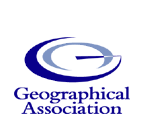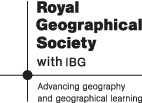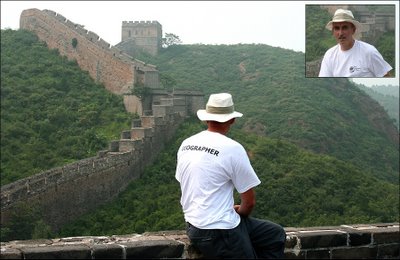 The GGiP T-Shirt does not just look fantastic on the GA / RGS-IBG Geography Teacher of the Year (2002), David Rayner... it would look amazing on you too! At just £10 a shirt surely you can't resist? Order your shirt now at www.passion4geography.co.uk!
The GGiP T-Shirt does not just look fantastic on the GA / RGS-IBG Geography Teacher of the Year (2002), David Rayner... it would look amazing on you too! At just £10 a shirt surely you can't resist? Order your shirt now at www.passion4geography.co.uk!
29 November 2006
Geographer T-Shirts
 The GGiP T-Shirt does not just look fantastic on the GA / RGS-IBG Geography Teacher of the Year (2002), David Rayner... it would look amazing on you too! At just £10 a shirt surely you can't resist? Order your shirt now at www.passion4geography.co.uk!
The GGiP T-Shirt does not just look fantastic on the GA / RGS-IBG Geography Teacher of the Year (2002), David Rayner... it would look amazing on you too! At just £10 a shirt surely you can't resist? Order your shirt now at www.passion4geography.co.uk!
27 November 2006
Casual Geography: Have you got any news?
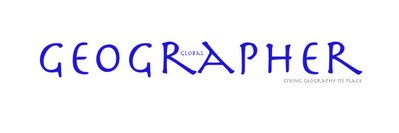 Have you got news?
Have you got news? The Global Geographer is a new fortnightly paper for people who are interested in geographical issues. Edited to traverse the academic, the teacher, the student and the curious, Global Geographer aims to bind the Geography community in an accessible format. We want you to read this on the train and then give it to teenager to enjoy. Think of it as Casual (yet critical) Geography.
The Global Geographer is interested in your news, views, research, photos and articles as and when they come up. It doesn’t matter who or where you are. We love talk about place, space, connections, environments, people and all things geographical. The only condition is that what you serve up must be easy to read despite all the rigor of your preparation. Items of 100 - 500 words are ideal, but don’t let us hold you back.
The Global Geographer is produced and edited by volunteers so for the foreseeable future so all contributions will be paid for in love. To contribute just email your item to Daniel at mygeographyteacher@googlemail.com.
Available by email and online, the Global Geographer is a free publication that will be available to download from www.passion4geography.co.uk from the first week in January 2007. To subscribe for free just email Daniel at mygeographyteacher@googlemail.com with the word ‘subscribe’ in the subject box.
26 November 2006
Channel 4 Geography
In a recent audit for Channel 4 of the channel's website by GGiP a number of microsites and programmes came up. This is not an entire list, but does give a feel for where Geography sits on the channel. It prooves that Channel 4 has an audience of people who are very interested in geographcial issues and events. GGiP's concern is that the audience may not be aware that they are exploring geography because (with the exception of Nick Middleton) Geographers are not used (or worse still, Geographers fail to call themselves Geographers).
Each weblink below is backed up by a star system (strength of link to the UK Geography curriclum... the greater the number of stars the stronger the link), a suggestion of key stage link within the English Geography Curriculum and a number of questions that place where the microsite or programme sits within Geography.
Hazards and Disasters
http://www.channel4.com/news/microsites/T/tsunami/index.html ***** KS 3/4/5
What were the causes and effects of the tsunami? How and why were some people and places affected more than others? How prepared were different places for the tsunami and where had the best response? Which countries gave the best response to the tsunami and why? Where is most vulnerable in the future? How did human and physical geographies influence the effects of the tsunami? How am I connected to the tsunami? What should people and places do to prepare for future tsunamis?
http://www.channel4.com/science/microsites/F/force_of_nature/ *** KS 3/4/5
What combination of physical / environmental factors can lead to extreme risk? How can understanding the physical environment help people mitigate and survive risky places? What causes extreme weather and natural disasters and how do you survive them? What equipment is needed to survive the forces of nature? How can geographers research the causes and effects of the forces of nature?
http://www.channel4.com/history/microsites/G/great_san_francisco_earthquake/ ***** KS 3/4/5
What are the causes and effects of Earthquake hazards? What can be learnt from the Great San Francisco earthquake? How might San Francisco be affected by tectonics in the future? Why are some places affected more than others by earthquakes?
http://www.channel4.com/science/microsites/S/science/nature/krakatoa.html ***** KS 3/4/5
Why is Karakatoa where it is? What were the causes and effects of the Krakatoa eruption? Why were the effects of the eruption so severe? How did people respond to the eruption and what should they have done? What are the physical effects of volcanic eruptions and in what order do they happen? What evidence is there for past volcanic eruptions? Why are some people more affected than others by volcanic eruptions? Could this happen again and what could be done to prepare for future hazards?
http://www.channel4.com/science/microsites/B/birdflu_equinox/ ***
What role does Geography have in the spread of disease? How might globalisation and cheaper travel influence the spread of disease? How well prepared are different people and places to cope with the spread of disease and why? Who is the most vulnerable and why? What is the relationship between the physical world and human environments in the spread of disease?
Physical Environments
http://www.channel4.com/science/microsites/A/alive/index.html *** KS 3
How do people interact with the physical environment? How have humans and other life forms adapted to survive on the plant? What can they do to survive in extreme environments?
http://www.channel4.com/science/microsites/M/mars/facts.html * KS 3
How does the Geography of Mars compare to that of Earth? How might space be used by humans in the future?
http://www.channel4.com/science/microsites/P/planetstorm/index.html * KS 3
How can weather and climate be studied on planets other than Earth? How does weather and climate affect life, geology, landforms and other geographies? What are the causes of different weather? How does weather and climate vary on other planets compared to Earth?
http://www.channel4.com/news/weather/ ** KS 3/4
http://www.channel4.com/life/microsites/S/surviving_extremes/ *** KS 3/4
What makes some environments so extreme? How have people adapted to survive in different extremes? How do these different extremes influence people’s way of life? How do extreme climates influence other parts of the physical environment such as animals, plants and the landscape of those places? How would I survive if I were in one of the extremes?
Environmental Change
http://www.channel4.com/science/microsites/G/global_warming/ *** KS 3/4/5
For students to explore their role in Global Warming. What’s it got to do with them, how does it affect people elsewhere in the world and what can they do about it?
http://www.channel4.com/more4/documentaries/doc-feature.jsp?id=73 * KS 4/5
How does the physical environment influence economic and social development? How can resources be exploited sustainably?
http://www.channel4.com/news/dispatches/themes/environment_theme_landing.html ***
Are we running out of space for our rubbish in the UK? What are the possible solutions?
http://www.channel4.com/science/microsites/E/environment/index.html ***** KS 3/4/5
What is sustainable development? What might happen if humans continue to use the environment as they are at the moment?
http://www.channel4.com/learning/microsites/P/planet/ ***** KS 3/4/5
What’s my relationship with my/our planet? How do I affect people and environments positively or negatively? What can I do to improve or worsen my relationship with the environment? What are other people doing to other environments and people?
http://www.channel4.com/science/microsites/T/terra2050/ **** KS 3/4/5
How is what we are doing now affecting our possible futures? How might our human and physical environments change and why? What can be done to promote the best possible futures and reduce the risk of the worst futures? Which places will experience the greatest environmental problems and what will they do? What can we do within our places to prepare for the future? How prepared is my place for the future? What do I think will happen in the future?
Development and Inequality
http://www.channel4.com/science/microsites/M/makepovertyhistory/ ***** KS 3/4/5
What are the causes and effects of poverty? What can be done to reduce poverty? How am I connected to poverty in the UK and elsewhere in the world? What role can technology play in reducing poverty? Where are the worlds poor and what are the reasons for this spatial distribution? How can development be made sustainable? How does what happens in ‘my place’ influence what happens in ‘their place’?
http://www.channel4.com/science/microsites/T/terra2050/ **** KS 3/4/5
How is what we are doing now affecting our possible futures? How might our human and physical environments change and why? What can be done to promote the best possible futures and reduce the risk of the worst futures? Which places will experience the greatest environmental problems and what will they do? What can we do within our places to prepare for the future? How prepared is my place for the future? What do I think will happen in the future?
http://www.channel4.com/learning/microsites/P/planet/ ***** KS 3/4/5
What’s my relationship with my/our planet? How do I affect people and environments positively or negatively? What can I do to improve or worsen my relationship with the environment? What are other people doing to other environments and people?
Conflict
http://www.channel4.com/news/dispatches/themes/war_on_terror_theme_landing.html ** KS3
What is the relationship between ‘place’ and terror? Why are some places effected, the source of or the reason for terror more than others? How can a conflict elsewhere in the world affect me in the UK? What role does place have in the formation of identities of terror?
http://www.channel4.com/life/microsites/N/newworldwar/index.html ** KS3
http://www.channel4.com/culture/microsites/D/dont_panic/ ** KS3
What are the causes of the New World War? Why are some places affected more than others and which are most vulnerable? How are these different places connected to one and another? How well equipped am I / the government in dealing with attacks? How is what happens in my places linked to beliefs in other places? Why was London bombed and now somewhere else in the UK?
Place
http://www.channel4.com/news/microsites/U/unreportedworld2006/ ***** KS 3/4/5
Nearly all episodes have a distinctive link to geography. On the media side this could be to question why some places go ‘unreported’. The most recent episode on migration to the USA from Central America is about migration, inequality, quality of life and standards of living, identity, how places are connected, perceptions and realities of places, conflict and many more..
http://www.channel4.com/life/microsites/A/afghanistan/ **
http://www.channel4.com/more4/event/I/iraq.html **
For students to use as a place study to understand the causes of poverty, conflict, commonality and difference.
http://www.channel4.com/news/dispatches/themes/repressive_regimes_theme_landing.html *** KS 3/4/5
What are the effects of repressive regimes? How do repressive regimes affect neighbouring nations?
http://www.channel4.com/history/microsites/E/extremearchaeology/prog.html ***
How can geographical skills be used to find evidence of past peoples and places?
http://www.channel4.com/more4/documentaries/doc-feature.jsp?id=95 *** KS 4/5
Why have Ghettos formed in the UK? How does division of the UK’s population influence the identity of communities? What are the positive and negative effects of where people live? How does proximity influence people’s perceptions of others? How can town planning be used to challenge the formation of ghettos.
http://www.channel4.com/culture/microsites/S/selfportraituk/ *** KS 3
How does place influence identity? How does identity influence place? How can identity of peoples and places cause inequality, conflict, connections….
Exploration
http://www.channel4.com/history/microsites/H/history/n-s/silkroute.html ***
How has physical geography and industry shaped links between places? How has physical geography influenced the direction of trade routes and the development of settlements on them? How has trade influenced the culture of people on them? How have past geographies influenced those of the preset?
http://www.channel4.com/history/microsites/E/ends/shackleton_intro.html **** KS 3
What is the purpose of exploration and why is it important? How do you become an explorer? How do you plan for exploration? What did Shackleton discover about the geography of Antarctica? How did the physical geography influence their expedition? What is Antarctica and what is it like? How has Antarctica and the people who study it changed since Shackleton visited?
So...
Channel 4, don't let all these interconnected issues and places remain seperate. Use Geography to link them so that we can have a better understanding of them as the people, places, spaces and environments that link them together. Take a look at the wikipedia Geography Portal, why not put somthing like that within a Relation Browser?
Is the World Really Shrinking?
- Distance hasn't been abolished - it's simply been crumpled and distorted.
- Even then geography is about more than distance; it's about the existence of simultaneous variety - of peoples, places, and cultures.
- The cultural gaps, the social distances, the gulfs in understandings of the world, despite everything, remain strong. And increasing inequality ensures this is so.
- The very argument that we should all become the same is a vision provoking its precise opposite - the reassertion of local specificity.
- In fact, we persistently evade the starkness of these differences. Imagining other cultures as stuck at the back of a historical queue - 'developing' countries waiting to become 'developed', for instance, diminishes their actually-existing difference now.
22 November 2006
Stern Geography
"Climate change could have very serious impacts on growth and development. If no action is taken to reduce emissions, the concentration of greenhouse gases in the atmosphere could reach double its pre-industrial level as early as 2035, virtually committing us to a global average temperature rise of over 2'C. In the longer term, there would be more than a 50% chance that the temperature rise would exceed 5'C. This rise would be very dangerous indeed; it is equivalent to the change in average temperatures from the last ice age to today. Such a radical change in the physical geography of the world must lead to major changes in the human geography where people live and how they live their lives." http://www.hm-treasury.gov.uk/media/8A8/C1/Summary_of_Conclusions.pdf
Who better to make sense of these changes than Geographers?
Sign the Give Geography its Place petition at http://www.passion4geography.co.uk now!
14 November 2006
G-Team Wins the Today Programme
"Alongside this year's batch of Christmas guest editors we asked for a team of Today Programme listeners to take the helm for a day. We received lots of outstanding applications. Thank you to everyone who entered.
Thousands of you voted - thank you for that - and a clear winner has emerged. The winning team is the geographers. They are: David Lambert from the Geographical Association; Dan Raven-Ellison, a geography teacher; and Hannah Bosher, one of his GCSE students. Congratulations!"
13 November 2006
12 November 2006
UK vs US Geography Cup 2006
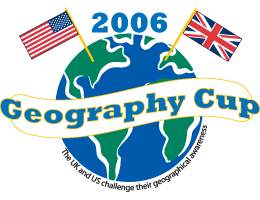
On the 12th of November 2006 a global competition will begin to prove once and for all who knows their geography better. Every resident in the UK and USA is being called upon to participate in the first ever Geography Cup (www.geographycup.com) to decide once and for all which country has the best geographical knowledge.
The media in both countries have in recent months been highlighting the lack of geographical knowledge in both countries so two organisations have now joined forces to bring together potentially millions of people from both sides of the Atlantic in a dramatic showdown.
The organisers of the transatlantic contest are the UK-based Give Geography its Place Campaign (www.passion4geography.co.uk) and the developers of the website are the USA-based Geography Zone (www.geographyzone.com) The Geography Cup is not just about finding out how good we really are at knowing where countries are in our world but is also designed to test our awareness of what is going on in the world. Modern Geography is about using big concepts to enquire into and tackle tough issues like climate change, poverty, sustainable energy, identity, migration and the connections between them. For this reason whilst the majority of questions are about geographic locations there will be three random questions based on geographical issues explain the organisers.
Results The results of the Geography Cup will be plain to see when the competition ends on the last day of 2006. A follow up press release will be issued in January 2007 with a demographic break down of the results and comment from geography education experts on both sides of the Atlantic.
If you are in the UK or US take part now!
10 November 2006
Get your GeoVideo made into a BBC Newsnight item
This has got to be an excellent chance for academics, teachers, students, professional geographers and beyond to put the subject on the media map.
If you want to do some geo-journalism but don't feel like going in Newsnight why not contribute to the Geography of Happiness project. Funded by the RGS-IBG, Geographical Association and supported by the BBC the project has invloved 11 Geographers travelling to 6 countries on very limited budgets to find out what makes 'places' happy. There are standard questions that anyone can ask anywhere before uploading the video onto the website. It's all easy as somthing very easy so just ask if you want to contribute. GGiP was born out of this Geography of Happiness team...
8 November 2006
Vote for the 'G' Team for the Today Programme now!
6 November 2006
A Geographical BBC Today Programme?
Here's our pitch!
In search of the G spot
We heard recently a prediction that the human race will need three planet Earths by the year 2050. This is impossible to contemplate. So we think we should focus more on the living space we have.
Our editorial line will focus on the ‘space’ in which we live, places and what makes them special and on understanding our interconnected lives. We are going to seek out and stimulate the G spot of issues and stories. G is for geography, and we are going to use geography as our main editorial ‘lens’.
We have an inter-generational editorial team of three geographers. The youngest member of the team, Hannah, brings the perspective of one who has a long future ahead of her. She is part of a generation which may see the world in radically new ways, via the internet. What is her space? Her teacher, Dan, has the task of making her lessons fun, useful, 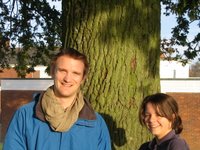 engaging and relevant. What does modern geography at school look like? David, who has been around for the longest time, thinks geography is the most significant subject to learn at school, and is vital for future thinking global citizens. Why is that claim not absurd?
engaging and relevant. What does modern geography at school look like? David, who has been around for the longest time, thinks geography is the most significant subject to learn at school, and is vital for future thinking global citizens. Why is that claim not absurd?
What we will do is devise a programme - we already have some great ideas – that will satisfy the curiosity of listeners at the start of the new year. These are the kinds of questions we will address with geography, beginning with the ‘living geography’ of young people:
Who am I? Where do I come from? Who is my family? What is my ‘geography’? Who are the people around me? Where do they come from? What is their ‘geography’? These kinds of questions concern identity. They link to further questions about …
… our place in the world: Where do I live? How does it look? How do I feel about it? How is it changing? How do I want it to change?
Living in the world has a cost, and we all have impact, which stimulate further questions about the Physical world: What is the world (and this place) made of? Why do things move? What becomes of things?
And of course, the Human world which we have made for ourselves is deeply political. Who decides on who gets what, where and why? What is fair? How do we handle differences of opinion?
A geographical perspective provides a fresh way of keeping all these questions in the frame, particularly the links between the physical and human worlds. Our editorial will try to demonstrate this. It will be worthwhile trying.
Why? Well, the Today Programme focuses on stories which frequently have a strong temporal narrative. Saturday 4th November was a good example. There were major items on
- The hold genealogy has over us in our search for our personal stories
- The heritage industry and the ‘History Matters’ campaign from the National Trust
- The US mid-term elections and the civil war – ‘history is everything’ was the phrase used.
The extraordinary Stern Review, published at the end of October, provides an account of the changing global climate and speculates on some of the impacts:
“Such changes would transform the physical geography of the world. A radical change in the physical geography of the world must have powerful implications for the human geography – where people live, and how they lead their lives.”
(Stern Review, Executive Summary p iv)
Geography is the subject that crosses over the physical and human worlds. Geographical perspectives may help us understand the world more fully.
The Editorial ‘G’ team
Hannah Bosher, Geography GCSE student at Langtree School, Reading
David Lambert – Chief Executive of the Geographical Association, Sheffield (www.geography.org.uk)
Dan Raven-Ellison, Geography teacher, Langtree School, Reading; co-leader of the Give Geography its Place Campaign
(www.passion4geography.co.uk)(http://givegeographyitsplace
Some initial programme ideas
My Space – will explore the relationship between online communities and ‘real world’ communities. The feature could explore nuisance spaces, distant friends and near foreigners, young people making sense of the world through the internet, how collaboration vs. mediation is changing learning and/or other issues the news raises.
Butterfly News – will explore news stories through ‘knock-on’ effects. The line of enquiry would investigate several stages of cause and effect to make connections between people, places and issues that the news does not often address.
Today, Now – what is happening ‘now’ across a wide range of countries. This could also be what are you doing ‘now’. This would act as a snap-shot of events and experiences from across the world to mark the start of the new year. Possibly the focus can be on aspirations, hopes and longings.
Risky Thinking – why don’t people tend to ask ‘what is the geography’ of this place or issue? Why could this absence of geographical thinking be ‘risky thinking’ especially when it comes to ‘risk’ topics? In this feature a range of top geographers would be invited to explore how thinking geographically can help us understand Global climate change, conflict in the Middle East, the spread and control of disease and nuisance spaces within our communities.
Living Geographies – in two parts this feature will look at how local and international geographies might be changing in 2007. Part 1 will enquire into local spaces in the UK (transport, housing, health and education provision, shopping, change and ‘sustainable development’ such as in Sheffield-Rotherham). Part 2 will enquire in to how distant localities are also experiencing rapid change and what might happen in 2007. These might include new oil wealth in Sao Tome and Principe or another current news story.
Mywalk – introducing the concept of ‘mywalk’ which is for all, young and old, to reconnect with urban environments and the often by-passed or ignored parts of it. Mywalk is about making us think about our emotional attachments to, and feelings created by, our day-to-day surroundings, the feelings invoked by inanimate things, unexpected encounters or taken for granted spaces. Mywalk will link to perceptions of tranquillity – what enhances or detracts from people’s sense of tranquillity:
- What flicks our switches?
- What turns us on?
- What tickles us?
- What disgusts us?
- What makes us smiles?
- What makes us feel warm?
- What makes us take the long way round?
- What do we love?
- What do we hate?
In the end, mywalk is about how best we engage and enthuse the public in exploring these geographies – that is, ‘our local environment/community’. This is of great interest to those interested in communities and local government
If you like the sound of this visit the BBC Today Programme website, compare us to the competition and then cast a vote!
3 November 2006
TES
2 November 2006
OS Free Maps for School (History Departments)
 If you teach in the UK and have not yet applied for your free maps from Ordnance Survey you had better be quick as the deadline is the 17th of November . The scheme is amazing for all Geography departments and thousands of Year 7 students as the OS gives a free map (of a place of each schools choosing) to each student. A great way for student to enjoy the subject and discover geography where they are.
If you teach in the UK and have not yet applied for your free maps from Ordnance Survey you had better be quick as the deadline is the 17th of November . The scheme is amazing for all Geography departments and thousands of Year 7 students as the OS gives a free map (of a place of each schools choosing) to each student. A great way for student to enjoy the subject and discover geography where they are.It's just a shame that this year the competition suggests that the maps might be better placed in a History classroom rather than a Geography one. Don't get me wrong now, as stated earlier in this blog, GGiP has nothing against History and yes Historians do needs maps as Geographers need to understand the past, but this is taking it a step to far.
The OS maps for schools competition has a day filming with the 'Time Team' as its prize. This is a fantastic prize and one which many students would be ecstatic to win (as I would). Of course archaeology has close links to both Geography and History, but I am worried that many Year 7 students will just make the wrong links (Geography competition, History prize).
What OS should be looking to do is promote Geography, help create role models for Geography, inspire students to use maps for the Geography and not join the masses that support other subject areas. The OS of all organisations should recognise the role and importance of Geography.
The OS do come to most Geography related conferences. Mind you, Geographer Fiona Reynolds, director of the National Trust gave the public lecture at the Geographical Assocation conference this year in Manchester (UK) and they appear to be doing more for History than Geography. Maybe the OS is thinking the same thing...
As Fiona said in her lecture at the GA
"..we have a lot to do to raise the profile of geography in the wider world. Not just because we are passionate about it – though we are; but because, quite literally, we can’t live without the skills, knowledge and insight that geography provides."
Quite right. So let's start doing more Geography in public OS and NT. Let's get the word Geography, the grammar of Geography, the syntax of Geography and Geography role models all over the place.
OS - Let's get the word Geography or Geographer or Geographical added to the cover of your maps. What about using words like 'place' and 'space' at least once on your Landranger Maps?
NT - Lead the way! Let's have a 'Geography' section on your website.. why not talk about 'discovering the Geography' of place? You mention historical places and have history pages.. what about Geography? When I search for History in your site I get adult pages, when I search for Geography I only get schools pages... come in inspire the public to ask 'what's the geography of this place?'.
